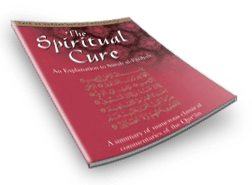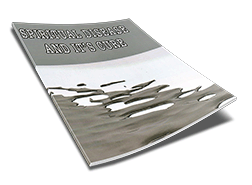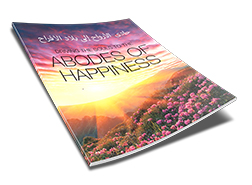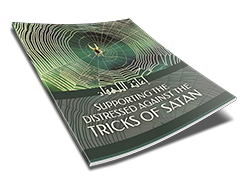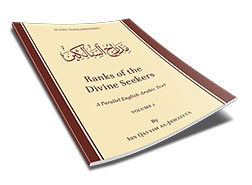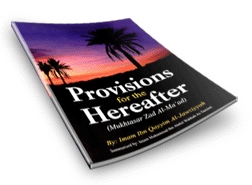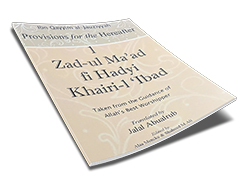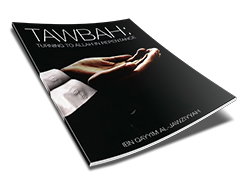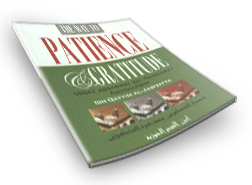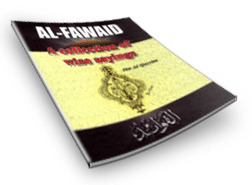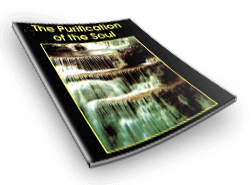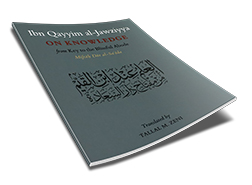Ibn Qayyim

In the Name of Allâh, the Most Beneficent, the Most Merciful
Muhammad ibn Abu Bakr (more commonly known as Ibn Qayyim or Ibn Qayyim al-Jawziyyah) (1292-1350CE / 691 AH- 751 AH) was a famous Sunni Islamic jurist, commentator on the Qur'an, astronomer, chemist, philosopher, psychologist, scientist and theologian. Although he is commonly referred to as "the scholar of the heart," given his extensive works pertaining to human behavior and ethics, Ibn Qayyim's scholarship was focused on the sciences of Hadith and Fiqh.
|
The Biography of Imam Ibn Al-Qayyim
This great Imam is well-known amongst both the early scholars and the later scholars as ibn Qayum alJawziyyah. Some shorten it and simply say ibn alQayyim. The biographical reference works are in agreement that the one who became famous with the title "Qayyim al-Jawziyyah" was his father: Shaykh Abu Bakr ibn Ayyub az-Zuri. He was the Qayyim, or director, of al-Madrasah al-Jawziyyah (the Jawzi school) in Damascus for a long period of time. Therefore, he was called "Qayyim al-Jawziyyah." Afterwards, his offspring and his grandchildren became famous with this ascription. Qayyim, in the language, means someone who is in charge of directing and managing something. As for its definition according to its technical usage, it does not go beyond that. It has the same meaning as Nazir or Wasi so a person can be called the Nazir of a school, its Wasi, or its Qayyim. They all have the same meaning. It is sufficient source of his pride that he should be in charge of this school because of the great influence it had amongst all the schools of that time. |
|
The Spiritual Cure
The Spiritual Cure, An Explanation To Surah Al Fatihah, A summary of Numerous Classical Commentaries of The Quran The underlying theme of al fatihah is one of contemplation and serenity; pondering the Names and Attributes of Allah, pondering the creation and acknowledging that He alone deserves praise and worship, that He alone should be asked for help, that He alone should be feared and hoped in that He alone should be invoked that there is indeed a Day of Judgement and that guidance has come to us and we are required to follow it. It calls us to carefully scrutinise our relationship with our Lord: are we living according to the dictates of 'none has the right to be worshipped save of Allah' or not? This opening chapter, despite its brevity, calls man to fulfil the rights of Tawhid, the right that Allah has over us to worship Him alone without any partners, in thirty places. This chapter summarises succinctly the message of the whole Quran Click to enlarge |
|
Spiritual Disease And It's Cure
The Imam was asked a long question of which a part was - What is the opinion of the scholars regarding a man who is afflicted by a disease, and knows that if it should continue it would damage his life? The Imam Quoted the Hadith from Sahih Bukhari The prophet (S) said: 'Allah has appointed a remedy for every disease He has sent down' Imam Ahmad reported on the authority of Usamah bin Shareek that the ' Prophet (S) said Allah has not made a disease without providing a remedy for it, wih the exception of one disease, namely old age' This Applies to the medicine for the heart, soul and body. The well being of the servant's heart, is far more important than that of his body, for while the well being of his body enables him to lead a life that is free from illnesses in this world, that of the heart ensures him both a fortunate life in this world and eternal bliss in the next. |
|
Remembrance of The Most Merciful
Those who are devoted to the remembrance of Allah, their heart will be at peace and tranquillity - full of joy and will find themselves in safety and security. For in the remembrance of Alläh do hearts find rest. In this very valuable and useful text the author - may Alläh have mercy on him - mentions 78 benefits of remembrance. In Qayyim commences the book with chapters related to the path of happiness, how to rectify the heart and cleanse it. He also talks about the different stages of them prayer, charity and fasting. He then goes through 78 benefits of remembrance of Allah. |
|
Heartfelt Advice To A Friend
In this short yet substantial tract of ibn al-Qayyim, he pens a message of heartfelt advice and appreciation to a friend of his by the name of 'Ala' Al-Din; invoking Allah's Kindness, Guidance and Blessing upon him.Within this translation of 'Risalatu ibn al-Qayyim ila' Ahadi Ikhwawanihi', the author explain the finer points of having a need in seeking Allah's Guidance in all of our affairs and the means to persist upon the Straight Path. The risalah includes six weighty elements by which a Muslim can achieve happiness and pleasure; and through which righteousness can be perfected. The knowledge-based content of the book reflects ibn al-Qayyim's attention to detail, while explaining it in an easy to understand manners, it's modeled as sincere advice to his friend that will of course, be of wider benefit to all who read it IN SHA ALLAH. |
Inner Dimensions of the Prayer
Author: ibn Qayyim Al-Jawziyyah | Pages: 96 | Size: 4 MB Today's pace of life has created an imbalance in many people's priorities, especially in diminishing spiritual fulfilment. Seldom do we find contentment or a sense of purpose in our daily routine; Masjid's are running on the hollowness of its congregations, homes have become dry of personal uplift - thisv is due to a distinct lack of understanding of what our prayer means and what it demands of us. |
Driving the souls to the Abodes of Happiness
Author: ibn Qayyim Al-Jawziyyah | Pages: 386 | Size: 22 MB Driving the souls to the Abodes of Happiness by Ibn Qayyim Al-Jawziyyah is an eloquent look at the beauty and luxury of the Gardens of Paradise, which Allah has prepared for those who sincerely believe in Him and do good deeds in accordance with the teaching of His messenger, Allah's peace and blessings be upon him. The author deals with various issues regarding Paradise and discusses the details of what lies within, based on Qur'anic verses and authentic sayings of the Prophet (SAW) |
Supporting the Distressed Against the Tricks of Satan
Author: ibn Qayyim Al-Jawziyyah | Pages: 263 | Size: 15 MB IMAM IBN AL-QAYYIM SAID: The enemy of Allah, the devil, knew that the heart held the central position on which everything depended; so, he endeavoured to fill it with all sorts of whispers and vain desires with the intention of diverting it from the right path. He surrounded it with sources of misguidance and set devices and nets to trap it. To get out of his tricks is not possible except by seeking the help of Allah, sticking to the causes of His pleasure and acquiring the humility of servitude, which is the best weapon a man can have to enjoy the protection of Allah; He said to Satan: You will have no power over My servants. (15:42) |
Newborn Baby Guide
Author: ibn Qayyim Al-Jawziyyah | Pages: 385 | Size: 20 MB The Prophet (peace and blessing be upon him) said, "Every one of you is a shepherd and everyone is responsible with regard to his flock." [Muslim] A child is a priceless trust from Allah, and raising children is no doubt among the most momentous events in our lives. Such obligation requires parents to learn, experience and adopt a steadfast and anticipatory approach to nurturing, with the aim of elevating standards of their family, their community and the ummah as a whole. This book plays a part in that journey as a guide for the newly initiated parents. |
Ranks of the Divine Seekers (Madarij al-Salikin)
This is an unabridged, annotated, translation of the great Damascene savant and saint Ibn Qayyim al-Jawziyya's (d. 751/1350) Madarij al-Salikin. |
|
Men and The Universe
Reflections of Ibn Al-Qayyem. This book was originally a section of Ibn Al-Qayyim's book Miftaahu Daar is-Sa'aadah (Key to the Abode of Happiness). This section was extracted from it due to its discussion of some of the Signs of Allah in the human beings and the universe. Also, Ibn Al-Qayyim's book was chosen due to its perceptive and meaningful wisdom. Another outstanding characteristic of this book is that Ibn-Al-Qayyim calls for the use of the intellect and self-introspection. He encourages the reader to deeply think about the creation of Allah, the Most High -- in the human being, existence, animals and nature. The complier, Capt. Anas Abdul-Hameed Al-Qoz, supports the writing of Ibn Al-Qayyim by mentioning modern scientific discoveries, useful notes and beneficial pictures that help achieve the objective. Thus, this book is a continuous and active call to all of mankind to look and reflect upon the Signs of Allah if they want the truth and sincerely wish to follow it. We will show them Our Signs in the universe and in themselves until it becomes clear to them that it is the truth.
|
Provisions for the Hereafter (Zaad Al-Ma'ad)
by Ibn Al-Qayyim Al-Jawziyyah. Allah has sent the Messenger (S) with guidance and the Religion of Truth. Strict adherence to the guidance of His Prophet (S) is required from the followers of Islam. The scholars of the Islamic community have attached great importance to it and produced texts regarding the Acts of Worship, Dealings and Habits in the light of the Divine guidance. This book is one of the most famous works written on this subject. This book is one of the important resources of knowledge for those who seek to know the Seerah of their Prophet (PBUH) as well as, the Fiqh learned from it. This is a book that is unique in that it explains the Sunnah through the Seerah and the Seerah through the Sunnah.
|
Zad-Ul-Ma'ad (4 Volumes)
Author: Ibn Al-Qayyim Al-Jawziyyah | Volumes: 4 This book is one of the important resources of knowledge for those who seek to know the Seerah of their Prophet sallallaahu alayhi -wa-sallcun) as well as, the Fiqh learned from it, this is a book that is unique in that it explains the Sunnah through the Seerah and the seerah through the sunnah. It is profound classic work _containing thousands of pages written by Imam Ibn Al Qayyum while on the Hajj journey (Pilgrimage), from Damascus to Makkah. Despite its being written from memory, the several thousand incidents, Hadiths, Ayat (verses of the Quran), Fiqh benefits, as well as, names of the companions associated with them, were remarkably close to the truth with marginal errors. |
|
Healing with the Medicine of the Prophet
Imam Ibn Qayyim Al-Jawziyah Healing with the Medicine of the Prophet is the panacea for those in search of good health. Although it was written by the author, Ibn Al-Qayyim, over six hundred and fifty years ago, it is extremely timely work for our generation in which health and natural health care products have become an important aspect of the lives of so many. The author presents the guidance of the Prophet in dealing with a variety of health issues, including treatment of ailment and preventive remedies to keep the body fit. As the Qur'an and Sunnah are the main sources of Islamic lifestyle, it only stands to reason that they should likewise be referred to in the matters of health and fitness. This is the approach taken by Ibn Al-Qayyim as he presents Verses of the Qur'an and statements of the Prophet as his main reference in these issues of health and medicines. The final chapters the this work include an extremely beneficial glossary of remedies, herbs, foods and other natural substances that aid in the journey towards better health. |
Tawbah: Turning To Allah in Repentance
Every human is susceptible to make mistakes. The Qur'an gives them hope and teaches them to ask Allah to take care of them and guide them to the right path. Tawbah: Turning to Allah in Repentance by Ibn Qayyim al-Jawziyyah deals with the spiritual side of tawbah without neglecting the physical requirement and conditions. It is taken from the book Madarij Al-Salikin Bayn Manazil Iyyaka Na'budu Wa Iyyak Nasta'in (The Stages of the Travellers Between the Stations of Only You We Worship and Only You, We Seek Help From), which is one of Ibn Qayyim's best works. Supported with extracts from the Qur'an and quotes from the Messenger of Allah (SAW) the author deals with apparent and deeper aspects of repentance, and the true essence of repentance and its conditions. |
The Way to Patience & Gratitude
By Ibn Qayyim Al-Jawziyya
Patience and Gratitude are the keys to success in this world and the next, as Imam Ibn Qayyim Al-Jawziyya explains in a beautiful Manner in this Book.
In the name of God, Most Gracious, Most Merciful
By the Time,
Verily Man is in loss,
Except such as have Faith, and do righteous deeds,
and (join together) in the mutual teaching of Truth,
and of Patience and Constancy. |
|
Patience and Gratitude
Imam Ibn Qayyim Al-Jawziyah This is an abridged translation of Uddat as-Sabrin wa dhakhirat ash-shakrin by Ibn Qayyim. The author explains the Islamic concept of sabr (patience) and its counter part shakr (gratitude), in a practical fashion. |
|
Al-Fawaid (A Collection Of Wise Sayings)
Imam Ibn Qayyim Al-Jawziyah This book, AI-Fawaid: A Collection of Wise Sayings is one of the well-known compilations of Imam Shams Ad-Dm Ibn Qayyim Al-Jawziyyah, who is well known by the name Ibn Al-Qayyim (may Allah have mercy upon him). This blessed book is not like others that simply contain sections, chapters and themes, but it consists of the elevated thoughts that Allah, Exalted be He, bestows upon some of His servants as He wills. So whenever any of these scattered pearls of wisdom occurred to the Imam, he would immediately record them. I am sure that he did not sit down and write this book in one or two weeks, but surely it was developed over a long period of time. Whenever something came to his mind, he would record it, and whenever he learnt a lesson or anything crucial in his life, he would illuminate the lines of his page with the ink of his pen.
|
|
The Path to Guidance - Ibnul-Qayyim
This is a book which the Shaikh, the Imaam, the ?Allaamah, the Shaikh of Islaam and the Muftee of the Muslims, Aboo ?Abdullaah Muhammad the son of Aboo Bakr - better known as Ibn Qayyim al-Jawziyyah - may Allaah the Exalted have mercy upon him, sent to one of his brothers. |
Characteristics of the Hypocrites
In the Qur'an, Allah has revealed the machinations of the hypocrites, He has unveiled their beliefs, their qualities, and made their goals clear so that the believers can be aware of them. He divided mankind into three groups in the beginning of Surah al-Baqarah: the believer, the disbeliever, and the hypocrite. He mentioned four verses concerning the believers, two verses concerning the disbelievers, and thirteen verses concerning the hypocrites due to their plenitude and the great harm and tribulation they bring to Islam and the Muslims. The harm they cause to Islam is truly severe for they claim to be Muslims, they claim to aid and support Islam, whereas in reality they are its enemies seeking to destroy it from within, covertly spreading their corruption and ignorance such that the unwary thinks that what they are upon is knowledge and right action. |
The Soul's Journey After Death
This important book covers an area about which most people have very little knowledge but which is at the same time, of vital interest to all human beings. It outlines what happens to the human soul from the moment of death until the arrival of the Day of Judgement. It describes the death profess itself, the exact relationship of the soul to the body, the states of the soul after it leaves this world, and the nature of the ongoing relationship between the dead and those who are still alive. Ibn al-Qayyim al-Jawziyyah was born into a scholarly and virtuous family in 691 AH/ 1292 A.D. At that time Damascus was a centre of literature and thought. Many schools were located there and he studied and graduated under the protection, direction and sponsorship of his father. He was particularly influenced by his Shaykh and teacher Ahmad b. Taymiyyah, and also by Ibn ash-Shirazi amongst others. Layla Mabrouk, an eminent, contemporary, Egyptian scholar has skillfully abridged a classic work by the well know scholar. |
The Purification of the Soul
According to the earliest sources, compiled from the works of Ibn Rajab al-Hanbali, Ibn al-Qayyim al-Jawziyya and Abu Hamid al-Ghazali, collected and arranged by Ahmad Farid. One the most concise references that can have a big impact on you once you read it. Topics gone into detail include symptoms of the heart's sickness and signs of its health, doing without the pleasures of this world, perseverance, complete reliance on Allah, the life of this world, to mention only a few. Excellent read!! |
Heaven's Door
By Ibn Rajab al-Hanbali, Al-Jawziyya & Abu Hamid al-Ghazali. Continuation of the popular first book "The Purification of the Soul," taking the works of Ibn Rajab al-Hanbali and Imam Abu Hamid al-Ghazali, two towering scholarly figures of Islamic history, and incorporating their work into this compilation. Discusses :Enjoining good and forbidding evil, Remembering death, Punishment and blessings in the grave, Day of Rising, Heaven and hell, Counsel on death |
Waswasah
The Interpretation of the book: 'Dham Al-Muwaswiseen wat-Tahdheer Minal Waswasah'. By Imam and Scholar Muwafaq Deen bin Qudaam al-Hanbali (ibn Qudamah al-Maqdisi al-Hanbali). Written by Imam Ibn Qayyim al-Juziyyah. Discussion of many related topics, such as: Niyyyah in taharah and salaah, Excessive use of water in wudu and bathing, Disregarding any waswasah about breaking wudu, Things that people are harsh in implementing, Carrying children during salah, Use of water left in open containers. |
Guidance to The Uncertain in Reply to the Jews and the Nazarenes
In his book Islam and the west Norman Daniel wrote: People seem to take it for granted that alien society is dangerous, if not hostile, and the spasmodic outbreaks of warfare between Islam and Christendom throughout history has been one manifestation of this. Apparently, under the pressure of their own sense of danger, Whether real or not, beliefs take shape in men s minds. |
Ibn Qayyim al-Jawziyyah On Knowledge
Author: Ibn Qayyim al-Jawziyyah | Pages: 335 | Size: 32 MB The renowned theologian and jurist Ibn Qayyim al-Jawziyya wrote numerous titles, many of which are still popular today. Amongst these is Key to the Blissful Abode (Miftah Dar al-Sa'ada). The present work is an abridgement of the first volume of Key to the Blissful Abode. In it, Ibn Qayyim focuses on the importance of knowledge and willpower, as means through which a person may attain Paradise. Willpower is the door and knowledge - in particular knowledge which pertains to God and His Attributes, the Qur'an and the example of the Prophet - is the key. Ibn Qayyim discusses the virtues and benefits of knowledge over wealth and worldly matters; the path to knowledge; the importance of pursuing knowledge and applying it in order to achieve guidance from God and protect oneself from doubts; the superiority of the scholar over the worshipper; the necessity of using knowledge and willpower as the bases for all actions if one is to achieve spiritual bliss. |

